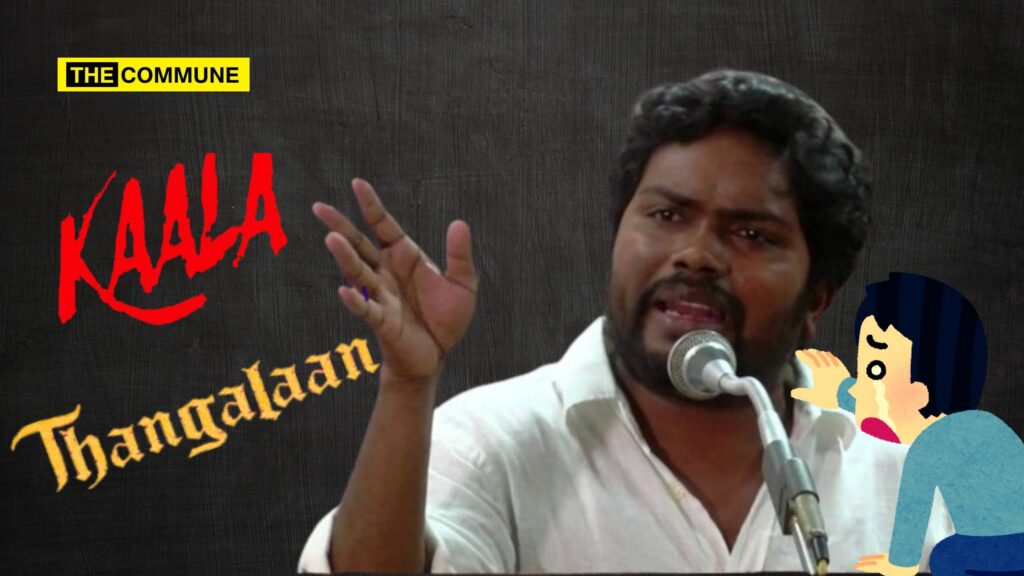After a series of disappointing movies with repetitive plots centred on his personal ideology, Pa Ranjith has become increasingly defensive about his failures. He blames both audiences and movie critics for his lack of success. With the release of his latest film, “Thangalaan,” he has taken a more extreme stance. Ranjith is now playing a victim card, criticizing everyone who found the film confusing and artificial as “anti-Dalit”.
He didn’t stop there. His “performance anxiety” is driving his claim that his work is unfairly targeted by anti-Dalit elements. Instead of constructively addressing criticism from respected film reviewers, Ranjith has defended his films by invoking his “Dalit” victim card as a shield against further critique.
Pa Ranjith – Victim Or Lousy Filmmaker
In a recent interview, Ranjith discussed his most recent movie, “Thangalaan.” While the plot was simple and mystical, he intentionally added layers of complexity. He blended themes of oppression, Buddhism, and other elements. He also believes that this blend left the audience overwhelmed and unable to comprehend the film entirely.
But when he speaks on stage, Ranjith seems to imagine that he is the victim of some imaginary group (read the evil Brahminical group) or conspiracy (read Brahminical conspiracy) undermining his success. However, this isn’t the case. Unlike in the past, when films were released primarily during festivals like Pongal and Diwali and had long runs in theatres, today’s technology allows audiences to enjoy intricate and imaginative plots from foreign and Indian films in their homes. Ranjith’s claim of pioneering magical, mystical cinema now seems misplaced, akin to Aishwarya Rajinikanth’s exaggerated assertion that “Kochadaiyaan” was a hundred times better than “Baahubali.”
First, Ranjith should know the audience’s pulse. When audiences see a trailer hinting at a mystic goddess and an ancient plot, they typically expect a captivating storyline enriched with mystical and mythological elements. They look forward to visually striking scenes featuring elaborate costume details, ancient settings, and special effects that enhance the film’s magical and historical themes. A strong narrative should solve what, when, how and why that evokes strong emotions, whether through awe, inspiration, or dramatic conflict. But all we get in The Thangalaan Nightmare is a weak story with a weak screenplay and underwhelming visual effects.
No Lessons Learnt From Kaala
In the past, let’s consider Ranjith’s film “Kaala,” which featured Rajinikanth.
Despite the high-profile cast, the film had a poor opening with negative reviews. It had disappointing collections in the Tollywood trade, earning only ₹6.33 crores during its first weekend in Telugu states. It is a significant shortfall compared to the ₹33 crores spent on its theatrical rights, indicating the film was likely to incur heavy losses. Although the film had a somewhat better opening in Tamil Nadu, the film’s business dwindled because of Ranjith shoving his ideology down people’s throats. Despite a total pre-release business of ₹60 crores in Tamil Nadu, “Kaala” managed to recover only ₹25 crores in its first weekend. The film’s poor performance and reasons highlight the disparity between expectations and actual results.
Why is that? Ranjith intentionally crafted “Kaala” as an antithesis to Mani Ratnam’s “Nayakan,” reimagining it from a Dalit perspective. However, it failed to capture the depth of Ratnam’s character, Vellu Nayakar. Ranjith’s approach, which leaned towards delivering subtle messages rather than engaging plots, missed the mark. Instead of developing a compelling narrative, “Kaala” became overly dramatic and preachy. The movie was didactic, particularly in the second half, which bored many viewers. While audiences tolerate slow-paced films, excessive emphasis on political messages makes it difficult for them to remain engaged throughout the film.
Now, he confronts the general audience at the theatre. He displays arrogance by insisting he will deliver his message in the film. If the audience ignores him, they are “casteists.” If they criticize him, they are “suppressing a Dalit director.”
Conclusion
It remains a question of what kind of person he is, as he seems to view everything through a caste lens. Let us presume Ranjith wants to avoid criticism or his films becoming flops. In that case, he should probably make documentaries for leftist dens of TISS, JNU or The News Minute‘s office. He may get all the simping he expects from audiences in such places.
That may be a better solution for him rather than complaining on stage. Nothing will come out of blaming the audience and seeking sympathy by playing the victim card for the failure of his films.
Subscribe to our Telegram, WhatsApp, and Instagram channels and get the best stories of the day delivered to you personally.

